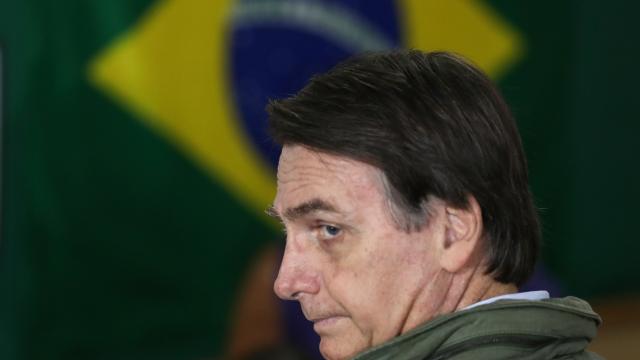It isn’t hyperbole to wonder if the outcome of Sunday’s presidential election in Brazil is a planetary game over when it comes to climate change.
Proto-fascist Jair Bolsonaro handily won the presidency on Sunday on a platform of xenophobia, homophobia, and a promise to silence political dissidents. It’s a dark day for the world’s ninth-biggest economy and the 47 million Brazilians who didn’t vote for Bolsonaro or subscribe to his views.
But his plans for the Amazon are what will reverberate far beyond the country’s borders and well into the future.
“[Bolsonaro] wants to massacre our diversity sexual, gender, cultural, racial and biological,” Felipe Milanez, a humanities and political ecology expert at Brazil’s Universidade Federal da Bahia, told us. “It means turning the Amazon into a huge soya field and killing all the diversity.”
The Washington Post reports that Bolsonaro has a plan to privatise vast swaths of the forest, turning it over to agribusiness and mining. In addition, he would like to expand hydropower and nuclear power in the region, and has indicated he will not let outside environmental groups have much sway over conservation.
He also said he would like to pull Brazil out of the Paris Agreement, meaning two of the world’s six largest carbon emitters will have potentially turned their back on international climate action.
His policies of environmental and cultural violence could work in tandem in the Amazon to devastating effect. The forest is already in a weakened state after decades of logging, extraction and agribusiness interests taking their toll. And while previous governments have paid lip service to protecting the region, degradation has continued.
How Bolsonaro proceeds has the potential to ripple across the Amazon and its people. Brazil is home to the largest chunk of Earth’s largest rainforest, but that forest stretches across eight other countries.
“The boundaries of ecosystems don’t follow political boundaries just like the atmosphere doesn’t,” Adrian Forsyth, the founder of the Andes Amazon Fund who has spent decades studying the region, told us. “If you dam the Amazon or disrupt the forest, you will destroy the food base for people in other countries.”
And within Brazil, the deregulation and budget reductions Bolsonaro has promised to implement increases the odds of human rights abuses that are already rampant. Last year, conservatives cut funding to the Brazil’s agency tasked with protecting indigenous rights and land, leading to an increase violence and land grabs according to a report by The Guardian.
“Land to us is our identity, our life, our existence,” Sonia Guajajara, executive coordinator of APIB Articulação dos Povos Indigenas do Brasil, which represents 300 indigenous groups, told us. “Without our territory, we have no means to exist and be what we are.”
The threat to indigenous people is likely to increase under Bolsonaro, who has expressed admiration for Brazil’s former military dictatorship that was part of a wave of neoliberal suffering that afflicted Latin America in the 1970s.
In fact, Bolsonaro has argued Brazil’s prior autocratic leadership didn’t go far enough in its violence toward citizens. That regime killed at least 500 Brazilians and tortured thousands more.
Milanez noted that Bolsonaro has the backing of the military, which could put more people in danger. He also has a Chicago School economist adviser, which is notable given the role the school’s privatisation proponents played in Latin America in the 1970s, and the violence that accompanied those policies.
The threat of violence may be felt most keenly by those outside the majority or who control land Bolsonaro would like to turn over to big business.
“We [indigenous groups] have never been a priority of any previous administration,” Guajajara said. “What is about to come from Bolsnaro has never been done before. It is the first time that when a candidate has said he is going to do all his campaign promises that the response has been terror. This is a destructive agenda that wants to promote genocide.”
Bolsonaro’s rise to power has been marked by violence, threats and even murder. But the violence could soon ripple around the world in a planetary sense.
The Amazon is commonly called the lungs of the planet, because it absorbs an astounding quarter of all carbon dioxide that land around the globe takes up each year. However, its natural carbon sink seems to be diminishing. Research published in 2015 showed the Amazon takes up a billion tonnes less carbon than it did in the 1990s.
Some of that may be due to climate change, which is contributing to drying out the Amazon, but environmental degradation resulting from lax enforcement of environmental laws also plays a role.
“There has always been a problem with the enforcement of regulation — not the absence of regulation,” Heike Doering, an economic development researcher at Cardiff University, told us.
Bolsonaro’s plan to turn more forest into soybean fields could reduce the Amazon carbon sink even further. That would mean more carbon in the atmosphere speeding along climate change, and a drying out what forest is left.
And without the Amazon functioning near full capacity, humanity has little to no hope of constraining climate change to within 2C of pre-industrial levels, let alone the more ambitious 1.5C target.
Because irony is dead, Brazil is set to host international climate talks in 2019.
